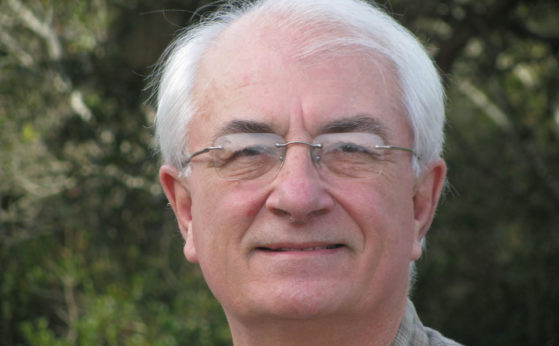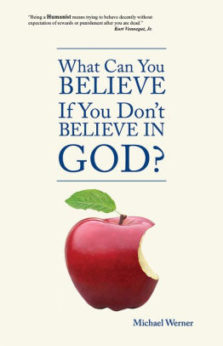
Just before I sat down to write this review I opened a Chinese fortune cookie, which read: “There will always be delightful mysteries in your life” (followed by some lucky numbers I don’t care to share).
And I recalled a lovely poem by a Humanist minister and poet, Robert Weston, whom Michael Werner quotes in his new book, What Can You Believe If You Don’t Believe in God? Here’s a passage from that poem:
Earth warmed by the sun, lit by sunlight;
This is our home;
Out of the stars have we come.
Mystery hidden in mystery, back through all time;
Mystery rising from rocks in the storm and the sea.
Out of the stars, rising from rocks and the sea, kindled by sunlight on earth, arose life.
Ponder this thing in your heart, lift up from the sea:
Eyes to behold, throats to sing, mates to love.

Weston’s point—and Werner’s—is that after all the scientific advances in understanding that humanity has painstakingly achieved, beating back superstition and ignorance, we know so much now about the universe that religion once sought to explain. Going way back, as Weston’s poem does, to the Big Bang, many of us content ourselves not wasting energy speculating about the “god” or “being” or “intelligence” that “created” it.
Yet transcendental questions—existential ones, if you will—still remain: What is true? What is the meaning of life? What matters? Why are we here? How do we deal with the many things we still have no answer for? And if we have no religion and no gods, how do we formulate our moral and ethical codes for living?
In barely over 200 not too densely printed pages, Werner walks us through some history and basic philosophy of the Humanist movement, pointing out that the numbers of nonreligious Americans is growing yearly: The percentage now stands at about a quarter of the population. Most remain unaffiliated with any Humanist groups or organization, and many might not even be familiar with the term. Some of them—and we all know such people—like to say they are “spiritual but not religious,” a timid way of staying within the limits of common respectability without any of the obligations.
Werner quotes the Humanist Manifesto III with “as good as any definition I have seen”: “Humanism is a progressive life stance that, without supernaturalism, affirms our ability and responsibility to lead meaningful, ethical lives capable of adding to the greater good of humanity.” Or in the words of renowned Humanist and novelist Kurt Vonnegut, “Being a Humanist means trying to behave decently without expectation of rewards or punishments after you are dead.”
There are many varieties of Humanism, all with a slightly different focus, such as atheism, naturalism, secularism, rationalism, and more—even religious and Marxist Humanism. Legions of critics can recite by chapter and verse all the contradictions and inanities, not to mention the cruelties, in biblical and other religious texts. There is certainly a place for such opponents of religion. Yet Werner wants instead to concentrate on what it takes, as Humanists, to seek “the good life and good society,” to live by the motto “Deed, not creed.”
Changing human nature
Werner briefly surveys the history of critical thought, going back to the ancients. Coming up to the 19th century, he quotes the feminist Elizabeth Cady Stanton: “The Bible and the church have been the greatest stumbling block in the way of women’s emancipation.” Her rallying cry was “No Gods, No Masters,” as “a first step towards women’s liberation.”
Yet this brings me to my most critical observation about Werner’s book. I suspect his thinking—and his failure to take the next logical step—is widespread in the Humanist movement. It would seem readily apparent—and it is stated and restated repeatedly in his book—that any decent-thinking Humanist would oppose racial, religious, gender or sexual orientation discrimination, and struggle for a world free of such assaults on personal dignity, equality and democracy.
Yet he falls short of identifying social or economic class as an appropriate subject for Humanist analysis. Nineteenth-century radicals, both male and female, also raised the slogan “No Gods, No Masters,” by which they meant no masters in the workplace. They, too, well knew the oppressiveness of the authoritarian hierarchy that reached down from God to his son Jesus to pope, cardinal, priest, rabbi and imam, to monarch, to nobleman, to pater familias, to principal, teacher, landlord, general and boss. All of it deriving from divine order.
Werner says, “Humanism reminds us that there are always those suffering alone on the margins of society and that our duty is towards improving their welfare.” But if Humanists as a movement want to appeal to a broader sector than the college educated (and mostly white), it would help to lend specific and conscious support to the labor movement which is now (as almost always throughout history) under such severe attack.
It is not enough to find allies among like-minded liberal and progressive activists. Our corporate-rule government is merrily dismantling the social safety net, including unions, pensions, healthcare, Social Security, Medicare and Medicaid. Humanists must also see the evil in the Janus decision, in Citizens United, in the decimation of consumer and workers’ protection, in the suppression of voters’ rights, as their own fight as well. There is no mistaking that capitalism as we know it in America would love to do away with unions completely. So then where will the votes come from to support the freethinking separation-of-church-and-state candidates that the Humanists want to see elected to office?
Werner is not a naïve goody two-shoes. He is deeply sensitive to the complexity of the human condition. “Our inner apes and our noble selves are in constant tension,” he writes. “They need constant controlling and balance if we are to grasp the ring and become the best we can be, both as individuals and a society.” Yet on that same page he also condemns “utopian thinking such as Communism” (ignoring for the moment the debate between “utopian” and “scientific” interpretations of the term). “The failure in Russia, over a bloody three-quarters of a century, to mold a ‘new Soviet man’ is a stark reminder that human nature isn’t easily changed.”
He is ultimately right about human nature: It’s not easily changed. But the social institutions within which we operate permit or discourage certain behaviors. I would argue that his broadside against the Soviet experiment is both historically questionable and morally obtuse. Not that all was rosy in the USSR, not by any means! But was the Soviet “three-quarters of a century” more especially bloody than European and U.S. colonialism during their far more than 75 years of occupation and repression in the Americas, in Africa and Asia? Was there not also a “bloody” military invasion by the Western nations, including the U.S., to try and smother the Russian Revolution in its cradle? Was there not also some honest attempt in the USSR to lift up the common man, the working class, women and national minorities, to bring enlightenment to the countryside? Was there not full employment there while the Western countries were experiencing the Great Depression? And did the USSR not suffer the worst brunt of the Nazi hordes and defeat fascism for the benefit of the entire world? Finally, apropos to this book, was there not also a valiant attempt (mostly successful, I believe) to remove the scales of submissive religion from the eyes of a couple of hundred millions of Soviet citizens, to inculcate values of science, knowledge and culture in schoolchildren?
In another place Werner speaks of people who can “be led astray by ideology. One only need look at the history of the Holocaust and of Stalinist Russia when millions of civilized people were led to commit genocide.” Wait a minute. There were criminal executions in Stalinist Russia, yes; gulags, yes; periods of hunger and war. But “genocide?” This assertion cannot be defended.
As the first of its kind in human history the USSR was a deeply flawed social experiment. But to wipe away one of the farthest-reaching Humanist movements ever seen on Earth ill serves his argument. Yes, progress can be achieved, people can be taught to live rationally and productively for the common good of all.
He admits as much toward the end of the book: “Europeans may not need church because they have been informed by a centuries old Humanist culture. Generally their Humanist community is the community at large. The European Western Enlightenment tradition of Humanism is deeply imbedded in their culture, unlike the United States where religion has been and is still a dominant force in our culture.” And a little further on:
“We have empirical evidence” of Humanism’s “vitalizing, up-building power of life” “in secular countries such as in European nations, Australia, and Japan that provide examples of how we can, indeed, be good without God.”
But if he pays homage to those “secular” nations that have “grasped the ring,” he has to acknowledge that these advanced social welfare systems did not drop from the sky. They emerged out of the Enlightenment as part of the “secular” socialist project, touched by Humanistic Marxist thinking through the influence of powerful socialist and working-class parties—which the United States never truly had, and which may explain more than the dominance of religion.
 If it weren’t for the constant assaults by the transnational capitalist class to impose scarcity, austerity, fear and war, and walk back our social advances with racism, anti-woman and anti-immigrant prejudices, among others, it might be possible to say that indeed “human nature” can be changed for the good.
If it weren’t for the constant assaults by the transnational capitalist class to impose scarcity, austerity, fear and war, and walk back our social advances with racism, anti-woman and anti-immigrant prejudices, among others, it might be possible to say that indeed “human nature” can be changed for the good.
In short, and I say this as a Humanist myself, it would be wise for the cause to broaden Humanism’s outlook to openly, warmly embrace and encompass the labor movement. Our goals are ultimately inseparable.
The only other comment I would make is that Werner tends toward name-dropping, sometimes up to four or five quotes on a page from individuals who are neither identified nor cited nor listed in his short but helpful bibliography. Frustratingly, there is no index.
With these important exceptions that I believe mar Werner’s approach, it’s a highly readable, substantive book that should serve to answer many questions without presuming to address every mystery of the universe. I would definitely recommend it to those examining what they believe, and why, and if there might be a more systemic and satisfying way of organizing their thinking about some of the big questions in life.
Michael Werner
What Can You Believe If You Don’t Believe in God?
Washington, D.C.: Humanist Press, 2017
Print and eBook versions available
220 pages










